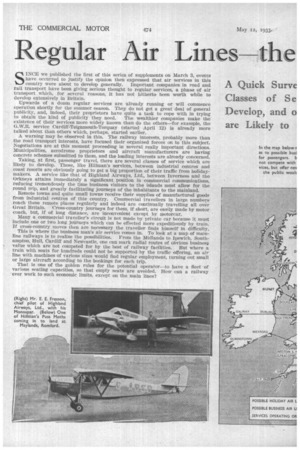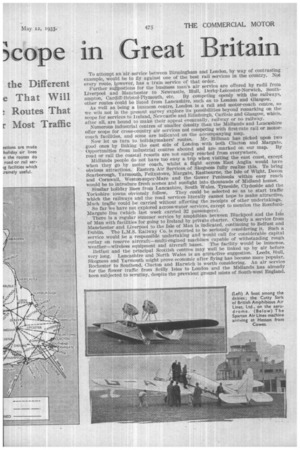ular Air Lines the ;cope in reat ritain
Page 50

Page 51

If you've noticed an error in this article please click here to report it so we can fix it.
SINCE we published the first of this series of supplements on March 3, events have occurred to justify the opinion then expressed that air services in this country were about to develop generally. Important companies in road and rail transport have been giving serious thought to regular services, a phase of air transport which, for several reasons, it has not hitherto been worth while to develop extensively in Britain.
Upwards of a dozen regular services are -already running or will commence operation shortly for the summer season. They do not get a great deal of general publicity, and, indeed, their proprietors have quite a task to cope with in trying to obtain the kind of publicity they need. The wealthier companies make the existence of their services more widely known than do the others—for example, the G.W.R. service Cardiff-Teignmouth-Torquay (started April 12) is already more talked about than others which, perhaps, started earlier.
A warning may be observed in this. The railway interests, probably more than the road transport interests, have focused their organized forces on to this subject. Negotiations are at this moment proceeding in several really important directions. Municipalities, aerodrome proprietors and aircraft manufacturers are having concrete schemes submitted to them, and the leading interests are already concerned.
Taking, at first, passenger travel, there are several classes of service which are likely to develop. Those, like Hillman's services, between industrial centres and coast resorts are obviously going to get a big proportion of their traffic from holidaymakers. A service like that of Highland Airways, Ltd., between Inverness and the Orkneys attains immediately a significant position in commercial communications, reducing tremendously the time business visitors to the islands must allow for the round trip, and greatly facilitating journeys of the inhabitants to the mainland.
Remote towns and quite small towns receive their supplies of manufactured goods from industrial centres of this country. Commercial travellers in Large numbers reach these remote places regularly and indeed are continually travelling all over Great Britain. Cross-country journeys for them, if short, are easily made by motor coach, but, if of long distance, are inconvenient except by motorcar.
Many a commercial traveller's circuit is not made by private car because it must include one or two long journeys which can be effected more expeditiously by train. If cross-country moves then are necessary the traveller finds himself in difficulty. This is where the business man's air service comes in. To look at a map of mainline railways is to realize the possibilities. From the Midlands to Ipswich, Southampton, Hull, Cardiff and Newcastle, one can mark radial routes of obvious business \ value which are not competed for by the best of railway facilities. But where a train with seats for hundreds could not be supported by the traffic offering, an air line with machines of various sizes would find regular employment, turning out small or large aircraft according to the bookings for each trip. That is one of the golden rules for the potential operator—to have a fleet of various seating capacities, so that empty seats are avoided. How can a railway 'ever work to such economic limits, except on the main lines? To attempt an air.service between Birmingham and London, by way of contrasting example, would be to fly against one of the best rail services in the country. Not every route, however, has a train service of that order. Further suggestions for the business man's air service are offered by radii from Liverpool and Manchester to Newcastle, Hull, Derby-Leicester-Norwich, Southampton; Cardiff-Bristol-Plymouth, etc. By competing openly with the railways, other routes Could be listed from Lancashire, such as to London and Glasgow.
As well as being a business centre, London is a rail and motor-coach centre, so we wilt not in the present survey explore its possibilities beyond remarking on the scope for services to Ireland, Newcastle and Edinburgh, Carlisle and Glasgow, which, after all, are bound to make their appeal eventually, railway or no railway. Numerous industrial centres of smaller density than the Midlands and Lancashire offer scope for cross-country air services not competing with first-rate rail or motorcoach facilities, and some are indicated on the accompanying map.
Now let us turn to holidaymakers' routes. Mr. .Hillman has picked upon two good ones by linking the east side of London with both Clacton and Margate. Opportunities from industrial centres abound and are marked on our map. By road or rail the coastal resorts are not easily reached from everywhere.
Midlands people do not have too easy a trip when visiting the east coast, except when they go by motor coach, whilst a flight across East Anglia would have obvious attractions. Eastern Air Services of Skegness fully realize this. To bring Scarborough, Yarmouth, Felixstowe, Margate, Eastbourne, the Isle of Wight, Devon and Cornwall, Weston-super-Mare and the Gower Peninsula within easy reach would be to introduce fresh scenes and sunlight into thousands of Midland homes.
Similar holiday lines from Lancashire, South Wales, Tyneside, Clydeside and the Yorkshire towns obviously follow. They could be selected so as to start traffic which the railways and the road services literally cannot hope to make attractive. Much traffic could be carried without affecting the receipts of other undertakings.
• So far we have not explored across-water services, except to mention the RomfordMargate line (which last week carried 32 passengers). There is a regular summer service by amphibian between Blackpool and the Isle of Man with facilities for going to Ireland by private charter. Clearly a service from Manchester and Liverpool to the Isle of Man is indicated, continuing to Belfast and Dublin. The L.M.S. Railway Co. is reported to be seriously considering it. Such a service would be a responsible undertaking and would call for considerable capital outlay on reserve aircraft—multi-engined machines capable of withstanding rough weather—wireless equipment and aircraft bases. The facility would he immense.
Belfast and the principal Scottish centres may well be linked up by air before very long. Lancashire and North Wales is an attractive suggestion. Leeds, Hull, Skegness and Yarmouth might prove economic after flying has become more popular. Rochester to Southend, Clacton and Harwich is worth, considering. An air service for the flower traffic from Scilly Isles to London and the Midlands has already been subjected to scrutiny, despite the prevalent ground mists of South-west England.




































































































